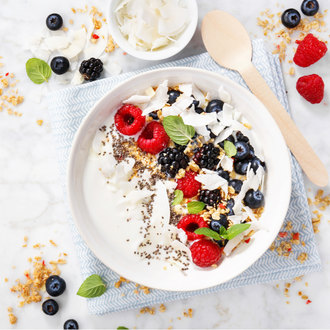The Gut Microbiome & Diet
Have you fed your microbiome today?
Your microbiome is the collection of microorganisms living in the gut and the habitat they live in. There are 10 times more microorganism than there are human cells in our body. The role of the microbiota is integral to human health and disease so much so that it can be considered another organ. Dysbiosis is when the balance of gut microbiota is disrupted. Dysbiosis can be caused by changes in diet, lifestyle, genetics and the environment such as antibiotics, travel and infection. This can reduce diversity, increase inflammation and reduce the strength of the mucosal barrier. Dysbiosis can lead to several disease states including IBS, IBD, type II diabetes, asthma, allergies, MS, Rheumatoid arthritis, colon and liver cancer and obesity.
Development of the gut Microbiota:
Microbial colonization of the human gut begins at birth during and after delivery. There is greater colonization with vaginal delivery vs. caesarean section. Maternal and post-natal diet can affect the colonization. Breastfeeding verses formula feeding and other environmental factors such as overuse of antibacterial agents and extensive antibiotic use also affect the microbiota. This initial colonization shapes the composition of the gut microbiota of the adult.
Key Functions of the Gut Microbiota:
Nutrient Metabolism: The gut bacteria produce a variety of different vitamins, synthesize amino acids, and ferment nondigestible carbohydrates such as resistant starches, cellulose, gums, hemicellulose, pectins, oligosaccharides and unabsorbed sugars and alcohols.
Host Immunity and protection from pathogens: The intestinal bacteria prevent pathogens from crossing the mucosal barrier, they produce antimicrobial peptides to signal our immune system to fight them off and compete for fuel by sheer number.
Gut-Brain Axis: this is the bi-directional communication between the gut microbiota and the brain that integrates neural, hormonal and immunological signaling. This allows the brain to command GI functions such as peristalsis and mucin production as well as immune functions. Stress can alter the habitat of the gut microbiota which can affect microbial composition.
Diet and the Microbiome
The Microbiome can respond to changes in diet in 24 hours. The typical western diet high in protein, sugar and low in fruit, vegetables and fibre has a negative effect on the gut microbiota. Whereas a vegetarian diet promotes the growth of bacteria that digest plant polysaccharides and a Mediterranean diet promotes the growth of other beneficial bacteria increasing production of SCFAs such as butyrate.
Gut microbes rely on carbohydrates that are metabolically available for breakdown to produce compounds that influence health and disease. These are called MACs or Microbiota Accessible Carbohydrates. When the diet is high in sugar and low in fibre and MACs it results in metabolic dysfunction.
Foods that promote a healthy microbiome:
Resistant Starch: Found in green bananas, oats, potatoes, lentils, green peas, rye, whole grains, white beans, and cooked and cooled potato, pasta and rice. Resistant to digestion by human digestive enzymes in the stomach and small intestine. Beneficial to microbiome. Results in an increase in Short Chain Fatty Acids (SCFA) such as butyrate, propionate and acetate, certain beneficial bacteria, improves insulin sensitivity, tissue repair and microbial metabolism. Butyrate acts as a fuel for colonocytes (cells in the colon) and acetate and propionate act in the liver.
Prebiotic fibres: Include inulin, fructooligosaccharides (FOS) and galactooligosaccharides (GOS). Food sources include chicory root, Jerusalem Artichoke, Dandelion greens, spit peas, watermelon, garlic, leeks, onions, asparagus, wheat bran, wheat kernels and raw banana. Prebiotics are fermented by microbes in the gut (bifidobacterial and lactobacillus) not only stimulating their growth but also prohibiting the growth of pathogenic bacteria in the gut.
Polyphenols: from fruits, vegetables, red wine and green tea
Good fats: improve inflammation and are immune-protective. Include monounsaturated fats in avocado, olive oil, nuts and seeds and omega 3 fats in fish and flax
Fermented foods: yogurts, kefir, sauerkraut (unpasteurized), kimchi, tempeh. All sources of live active cultures that may benefit the gut microbiota.
Foods that are bad for our microbiome:
Western Diet: white refined breads, pastries, flour, pop, sugar, processed and fast foods, low fruit and vegetable intake, low fibre, high in red meat and protein and high in omega 6 fats such as sunflower, safflower corn and hydrogenated oils.
Artificial sweeteners: Appear to induce glucose intolerance and should be avoided.
Food additives: carboxymethyl cellulose (CMC) in foods such as ice cream, eggnog, chocolate milk, soups and some cereals and Polysorbate-80 (P-80) an emulsifier in foods appears to cause inflammation, obesity and liver dysfunction in mice and may reduce nutrient update. Further research is needed on humans to determine if there is a safe amount that can be consumed in foods.
Next time you ask yourself: “have I done my workout today?” or “have I drunk enough water today?”, be sure to also ask “have I fed my microbiome today?















